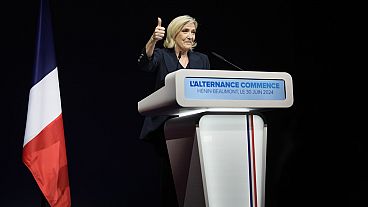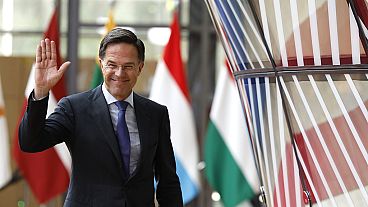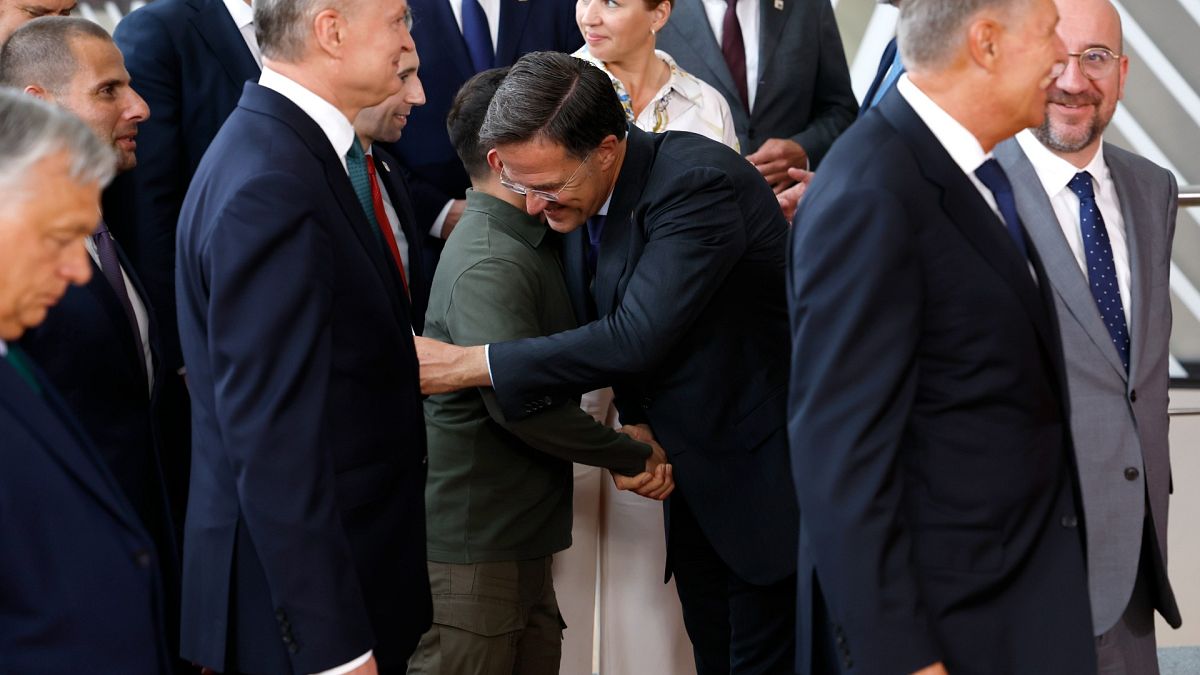This edition of State of the Union focuses on Mark Rutte's appointment as the next NATO secretary general and the opening of EU accession talks with Ukraine
Mark Rutte has made it! NATO finally appointed the outgoing Dutch prime minister as its next boss.
This move became a formality after his only rival for the post, Romania’s president Klaus Iohannis, quit the race, his bid having failed to gain traction.
NATO leaders will officially welcome him to their table at a summit in Washington in a little over a week.
For Ukraine, the appointment of Rutte, a fierce critic of Vladimir Putin who described the so-called Russian peace plan as "absolutely crazy", was great news.
And there was more good news for Kyiv this week.
The EU formally opened talks on Ukraine’s accession to the European Union. It has been hailed historic but the reality is that there is a very long way to go.
Nonetheless, the outgoing Belgian EU presidency saw the talks as morale booster.
“We know that we have a lot of work ahead of us", said Belgian foreign minister Hadja Lahbib. "But with unwavering determination, we are confident Ukraine can make it. We will be supporting you on every step of the way. You are not alone. We are with you.”
Whether the incoming Hungarian EU presidency will support Ukraine is doubtful. Budapest has been blocking support for Ukraine whenever it could.
Will that change?
We spoke to Teona Lavrelashvili, a political scientist at Catholic University in Leuven and a visiting fellow at the Wilfried Martens Centre for European Studies to find out more.
Euronews: So, the EU started the accession talks with Ukraine and Moldova just days before Hungary takes over the rotating Council presidency. Is this a coincidence?
Lavrelashvili: Well, I would argue that this is not a coincidence. Because we know that Hungary's priority is mainly on the western Balkans, especially on Serbia. Therefore, I think that the EU leaders were, let's say, constructive and smart enough to start the accession talks with Moldova and Ukraine before Hungary's presidency.
Euronews: As the opening of negotiations is only a small step in a long journey toward membership, can Hungary still derail the process?
Lavrelashvili: I think you indeed noticed and remarked very well, about the longevity of the steps. And when it comes to Hungary's role, we need to see the overall situation, of course. Also, we will need to observe who will take up the portfolio of enlargement. But I would say that, yes, Hungary still will have certain tools to influence the enlargement process in the upcoming months to come.
Euronews: Next to Hungary, there is another obstacle to enlargement and that is a certain Ukraine fatigue in some countries. How dangerous is that for Kyiv?
Lavrelashvili: This is to a certain extent dangerous in the long term. But in the short term, I would say that the enlargement negotiations and opening and closing chapters that say bureaucratic and technical process will continue. And I think this is a huge opportunity for Ukraine, but also for Moldova, because this will give and grant these countries an immense window of opportunity for their rapprochement with the European Union. And, of course, we know that expertise is missing. I think we should be clear in this respect, especially when it comes to environment, agriculture. And I think that Brussels will need to also help a lot of these countries.
Euronews: When can we realistically expect to have Ukraine as an EU member state?
Lavrelashvili: This is a tricky question. And I think that we cannot have a deadline or time frame in this respect because it depends on many factors. On the one hand, we have the political willingness of the European Union. And on the other hand, also, the ball is in the hands and in the court of Ukraine. It depends on the pace of reforms, but also on the security situation, I would say, how this will evolve because we have not discussed about one of the important, let's say, hurdles and obstacles to EU integration. Enlargement as such also will be security considerations next to the budgetary considerations from the EU side. So challenges are there. Therefore, I would say that naming a concrete deadline is tricky. But, again, the most important thing is to benefit as much as possible from the process of enlargement negotiations itself and make enlargement a transformative experience for Ukraine, but also for other enlargement countries.












